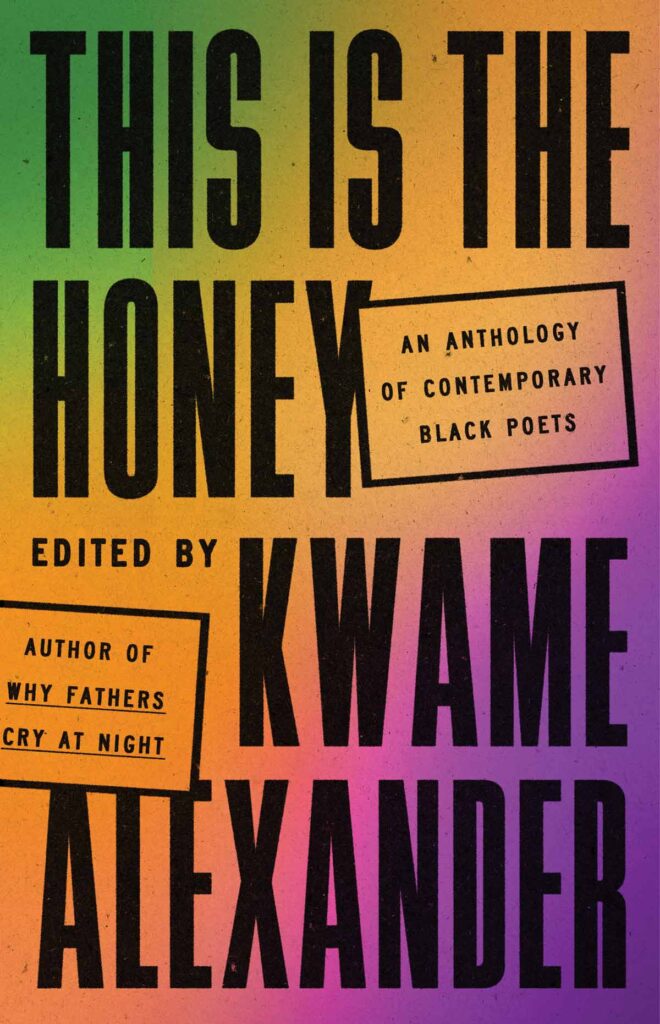An Anthology of Contemporary Black Poets
Kwame Alexander’s anthology This is the Honey: An Anthology of Contemporary Black Poets (Little Brown and Company, 2020) features poems from an intergenerational group of over 140 poets who represent different parts of the African diaspora.
Poets include those from the Black Arts Movement, the Hip Hop Generation, and those have emerged in the last two decades. The rich, vibrant, and varied voices in this collection are a testament to the joy and indomitable spirit of Black poets who in the words of Kwame Alexander represent the in-between.
Alexander asks readers to view this anthology as “a gathering space for Black poets to honor and celebrate. To be romantic and provocative. To be unburdened and bodacious.”
This is the Honey is in the tradition of Dudley Randall’s seminal collection of poetry The Black Poets: A New Anthology (1971) and E. Ethelbert Miller’s In Search of Color Everywhere: A Collection of African American Poetry (1994).
The anthology is divided into six sections: “The Language of Joy;” “That’s My Heart Right There;” “Where I’m From;” “Devotions;” “Race Raise Rage: The Blackened Alphabet;” and “When I See the Stars: Praise Poems.” These sections represent the breadth and complexity of poetry beginning in the Black Arts Movement and continuing to the present.
Readers will spend hours reading and reflecting on the subjects of the poems and how these poets have inspired them to think about joy, love, healing, rage, and grief.
They will recall the lives and accomplishments of iconic musicians, writers, artists, and leaders. Poets Lawson, Johnson, Mullen, Medina, Blackman, and Betts provide examples of the subjects explored.
The speaker in Len Lawson’s poem Elegy for Chadwick Boseman portrays Boseman as:
Our Ambassador of Blackness
When our own country
allows our genocide
When our protectors keep blasting,
Our bodies into the ancestral plan.
A hero who gave us black
icons on screen
Brooklyn-based poet Jacqueline Johnson in Black Gold Redux (for Nina Simone) expresses the impact of Nina Simone on her listeners:
Vocalized anger of a generation
Lived in your throat
Sometimes you left yourself
While still at the piano.
In We Are Not Responsible, the speaker in Harryette Mullen’s poem states:
We are not responsible for your
lost or stolen relatives,
We cannot guarantee your safety
if you disobey our instructions.
We do not endorse the causes or
claims of people begging for handouts.
We deserve the right to refuse
service to anyone.
The speaker in the poem closes with
the ominous words:
You were detained for interrogation
because you fit the profile.
You are not presumed to be innocent
if the police have reason to suspect
you are carrying a concealed weapon.
Step aside, please, while our officer
inspects your bad attitude.
Please remain calm, or we can’t be
held responsible for what
happens to you.
Tony Medina acknowledges the nature of Black boys who represent three dimensions of beauty: “Black boys like to sit in their quiet and think about things.” The speaker reflects on how: “We celebrate their preciousness and creativity. We cherish their lives.”
Toni Blackman’s poem Grief
urges readers to:
make your grief earn its place
don’t allow it to take up space
without
gifting you something
your existence, your presence
a present
be present
make sure your grief is
worth the pain
The voices of those in the criminal justice system also appear in these poems. In Reginal Dwayne Bett’s poem On Voting for Barack Obama with a Nat Turner T-Shirt On, the speaker provides the mindset of people in prison who upon being released realize that they have an opportunity to vote for a man who connects with them. He states:
In prison, people don’t even talk
about voting,
About elections, not really, not
the dudes you remember . . .
But your freedom hit just in time to see this brother high-stepping with the burden, with the albatross, willing to confess that he knew people like you.
Poets in This is the Honey: An Anthology of Contemporary Black Poets use evocative and metaphorical language to gain a deeper understanding of our experiences as readers in a world constructed by race and to reflect on our joys, longings, grief, politics, culture, and societal issues.
The poets provide a window by which we can examine the world in critical and creative ways. This is an anthology that readers will want in their collection of Black literature.
Kwame Alexander is a poet, educator, publisher, two-time Emmy-nominated writer-producer, and #1 bestselling author of 39 books including Why Fathers Cry at Night: A Memoir in Love Poems, Recipes, Letters, and Remembrances; The Door of No Return; and Light for the World to See: A Thousand Words on Race and Hope. Find him online at KwameAlexander.com.
Dr. Brenda M. Greene is Professor of English, Founder and Executive Director of the Center for Black Literature, and Senior Special Assistant to the Provost at Medgar Evers College, CUNY. For more information, visit https://www.drbrendamgreene.com
